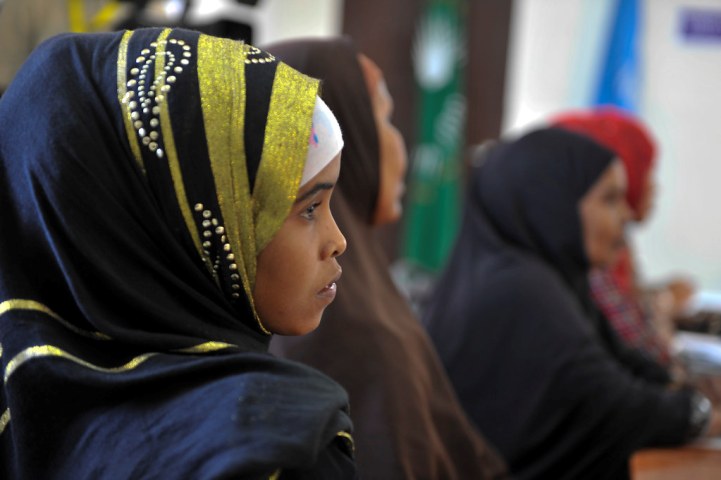UNDP-supported Somalia’s women media team celebrates year anniversary

Somalia’s groundbreaking all-women media team, Bilan, today celebrates a year of smashing taboos and blazing a trail for women journalists in a country ranked as one of the most dangerous places to report the news.
Established with support from the United Nations Development Programme (UNDP), Bilan has provided the first opportunity for Somali women journalists to exercise complete editorial independence, deciding what they want to report and how. They have already used this freedom to break some of Somalia’s first major stories on a range of challenging issues, spurring public debate and official reaction. This includes reports on HIV-positive Somalis living in fear, the abuse of female orphans, schools for autistic children and teachers, an epidemic of opiate use among women in Mogadishu and how drought hits women and families.
“Somalia hasn’t seen anything like Bilan before and we have opened people’s hearts and minds to the power of women in the media and the importance of having stories told from our perspective,” said Bilan’s Chief Editor, Fathi Mohamed Ahmed. “I am very proud to be the Chief Editor for Bilan because it provides a voice for the voiceless.”
Inside Somalia, Bilan’s reports have reached millions via the radio, TV and social media channels of Dalsan Media Group, which hosts Bilan at offices in Mogadishu. Bilan’s reports have also appeared regularly in international media, including the Guardian, BBC and El País, raising the profile of Somali women journalists and proving they can compete at the top of their profession, even while dealing with challenges that range from discrimination and threats of violence to interviewing high-profile figures with new-born children in tow.
Despite Bilan’s meteoric rise, all of its journalists have faced a difficult road to their current success and their individual stories show how tough it can be for Somali women to make it in journalism. Chief editor Fathi had to pretend to her parents she was studying IT while taking journalism courses and faced abuse in the streets this year for going to work while pregnant. Reporter Kiin regularly covers stories about refugees and IDPs but herself grew up in a refugee camp in Kenya. Youngest team member, Shukri had to face down social pressure when leaving her home in Baidoa for the first time to work at Bilan in Mogadishu.
“Over the last year, Bilan has provided a safe space where Somali women journalists can call the shots. They’ve used that power to bring new stories to light, covering issues like HIV/AIDS and gender violence, that have sparked some of the very first public debates on these subjects and transformed public attitudes to women in journalism,” said UNDP Somalia’s Deputy Resident Representative, Sophie Kemkhadze.
UNDP provides funding for Bilan and a programme of capacity building that has seen some of the most familiar names in media offer virtual masterclasses, including Lyse Doucet, Rageh Omaar, Lindsey Hilsum and Mishal Husain, helping to boost Bilan’s skills and confidence.
“Over the next year, we will be expanding the Bilan project to bring support to more women journalists in Somalia,” added Kemkhadze. “The women journalists of Bilan will play a key role in this by sharing their skills and experience, working on joint stories with Somali women journalists across the country and through the ongoing internship programme that sees Bilan host final-year students from Somalia’s top journalism faculties.”
“Bilan showcases the talent of Somali women journalists and disproves stereotypes,” said Bilan reporter Hinda Abdi Mohamoud. “It has provided me with a safe and secure environment in which to work and shows how a group of women journalists can manage a media unit and produce successful content.”










